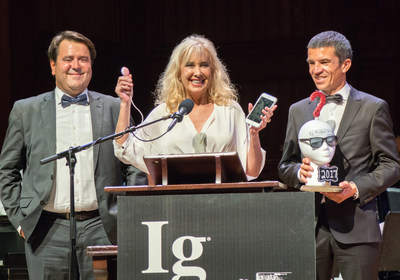- Dr. Marisa López-Teijón, director of this internationally renowned center in Assisted Reproduction, has received the Ig Nobel Prize for Medicine
- The awards, held at Harvard University, recognize the most surprising and innovative scientific researches of the year
- Institut Marquès follows a line of state-of-the-art research on the effects of music on embryonic and fetal development
BOSTON, Sept. 18, 2017 /PRNewswire/ -- Institut Marquès presented at the Massachusetts Institute of Technology (MIT) its scientific studies on the influence of music on embryonic and fetal development.

Their work, published in the prestigious scientific magazine Ultrasound, has discovered how fetal hearing works, showing that fetuses hear from week 16 (when they measure 11 cm / 4 inches), as long as the sound comes to them from the mother's vagina.
Dr. Marisa López-Teijón, director of Institut Marquès, Dr. Àlex García-Faura, scientific director of the center, and Lluís Pallarés, creator of the Babypod vaginal device, explained the conclusions of the study at MIT. Dr. Alberto Prats, Professor of Anatomy and Human Embryology of the Faculty of Medicine of the University of Barcelona, is also part of the research team.
This session at the Massachusetts Institute of Technologyis part of the Ig Nobel Awards Ceremony, which recognize the most surprising and innovative scientific researches of the year.
Ig Nobel Prize for Medicine
Dr. Marisa López-Teijón has been awarded the Ig Nobel Prize for Medicine, the first one in Obstetrics in the 27-year history of the award.
The Ig Nobel ceremony is held at Harvard University and Massachusetts Institute of Technology, hosting prestigious scientists from around the world to present their studies to the public in a fun and enjoyable way.
At the ceremony, Dr. Marisa López-Teijón explained: "Institut Marquès is carrying out state-of-the-art research on how music impacts embryonic and fetal development.
We have improved in vitro fertilization by applying musical vibrations inside the incubators in all our fertility clinics.
By inserting a speaker in the vagina of thousands of patients for the first time we have been able to communicate with the fetus. To achieve this we have created the Babypod. This is an FDA approved vaginal speaker that connects to the mobile phone.
Thanks to the Babypod, we have discovered how fetal hearing works: fetuses can barely hear noise outside the womb. The fetal ability to hear starts when the fetus only measures 4 inches or 11cm. Until now medical literature could only confirm that fetuses heard from week 26 onwards. Fetuses responds just like babies, with speech and movements because they are learning to communicate. The myth of talking to your belly is over."
According to Institut Marquès' studies, we can now communicate with the fetus and neurologically stimulate it. Any kind of sensory stimulation is good,-and the earlier the better.
Music stimulates language learning. And as we see, learning can begin in the womb.
The Ig Nobel Prize represents a recognition by these prestigious universities for the research of Institut Marquès to improve assisted reproduction treatments.
Interesting links:
Music and fetal stimulation:
http://www.fertility-experiences.com/what-is-the-meaning-of-music/
http://www.fertility-experiences.com/the-story-of-a-discovery/
http://www.fertility-experiences.com/the-story-of-a-discovery-2-the-first-tests-continue/
http://www.fertility-experiences.com/the-story-of-a-discovery-3-the-scientific-research-starts/
http://institutomarques.com/en/scientific-area/response-fetus-vaginal-music-2/
http://www.institutomarques.com/pdf/ultrasound.pdf
Music and fertility:
http://www.fertility-experiences.com/music-enhances-in-vitro-fertilisation/
http://www.fertility-experiences.com/ivf-to-the-beat-of-the-music-we-have-made-our-embryos-dance/
Scientific studies:
http://institutomarques.com/en/scientific-area/
http://institutomarques.com/en/scientific-area/response-fetus-vaginal-music-2/
http://journals.sagepub.com/doi/abs/10.1177/1742271X15609367?journalCode=ultb
Babypod:
Concerts for fetus and embryos
https://www.youtube.com/watch?v=SQNTqFRp09Q
https://www.youtube.com/watch?v=tQF5no3iLSg
Embriomobile:
http://institutomarques.com/en/observe-your-embryos-from-home/
More information: www.institutomarques.com and www.institutmarques.ie
Press contact United States:
Office: 617-520-7088
Mobile: 862-432-8436
Press contact Spain :
Institut Marquès Barcelona +34 93 285 82 16
Mireia Folguera: mireia.folguera@institutomarques.com +34 649 90 14 94
Estefanía Redondo: estefania.redondo@institutomarques.com +34 661 20 83 85
View original content with multimedia:http://www.prnewswire.com/news-releases/institut-marques-presents-their-studies-on-music-and-the-beginning-of-life-at-the-massachusetts-institute-of-technology-300520747.html
SOURCE Institut Marquès





